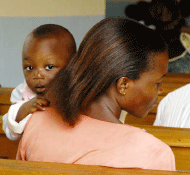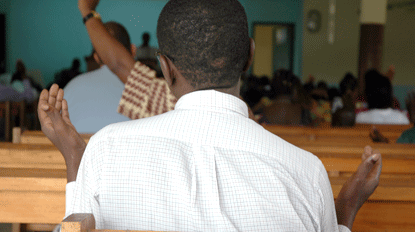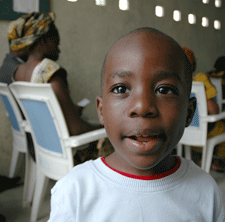|

|
our goal: church planting movements
by James Forlines
To read more about Free Will Baptist International Missions, visit their website at www.fwbgo.com.
Sean Warren, photography: FWB church service, Abidjan, Ivory Coast, West Africa |
"YOU MEAN WE HAVE SEVEN FREE WILL BAPTIST CHURCHES IN NEPAL? Isn’t it a closed country?” This was my response in 1999 when I attended the Free Will Baptist conference in North India. To my delight, I was introduced to Nepalese believers who had traveled to India for the conference. Nepal had been a closed Hindu kingdom for years. Openly converting to Christianity meant a prison term. But in the mid-1990s there were minor steps toward freedom.
Before we in the States knew anything about it, our Indian pastors had gone across the border and had begun planting churches. This was the evidence and fruit of a Church Planting Movement.
Church Planting Movement Defined
A Church Planting Movement is the rapid multiplication of indigenous churches planting more churches within a people group or geographic area. Though many factors may indicate a Church Planting Movement, two stand out: (1) Growth occurs geometrically (1,2,4,8. . .) rather than arithmetically (1,2,3,4…); and (2) Indigenous growth comes from within, not from without. In other words, the vision of churches planting churches spreads from the missionary/church planter into the churches themselves. Indigenous churches and not professional church planters or missionaries, then, start most churches.
The Challenge
When you consider the growing population of our world (This year, worldwide, 85 million more people will be born than will die. http://www.prb.org), it is evident we must accelerate the pace of evangelism and church planting. Exponential growth is critical throughout the evangelical missions community. Free Will Baptists need to commit ourselves to fostering Church Planting Movements in the areas where we work.

Strategic Efforts
So, how do we strategically align our priorities to bring this about? First, we confirm the role of the church-planting missionary. The missionary’s role is not to plant a church, but to facilitate an indigenous Church Planting Movement. In this role, the missionary may never be the “up front” personality, but rather may work with and train national Christians from the beginning.
Next, we develop synergy and momentum by promoting comprehensive field strategies. As groups of church-planting missionaries blend their efforts together, a true Church Planting Movement comes to fruition more quickly. Energies and esources are not duplicated. It becomes the DNA of our churches to plant other churches. Truly, we can do more together than each one working independently.
We encourage a holistic ministry. To truly penetrate a culture with the gospel, and thereby create a Church Planting Movement, we need to follow the example of Jesus. In addition to delivering themessage of salvation and hope, Jesus demonstratedthe message by feeding the hungry, healing the sick, and comforting the afflicted. He served the people. In so doing He earned the right to be heard. So will we.
Holistic ministry manifests itself in different ways, depending on the culture and how human need is expressed. Needs are obvious and straightforward in some cultures. People are hungry. Families do not have safe drinking water. Children are ravaged by disease. In other cultures substance abuse, family breakdown, or a disenfranchised immigrant population may provide opportunities to serve. As we demonstrate the message, Church Planting Movements are accelerated.
Historical Perspective
The war-torn country of Ivory Coast provides a good example. Free Will Baptists have been planting churches there since the late 1950’s. Still, hundreds of villages in northern Ivory Coast have no evangelical witness. Earlier this year, through the NGO created by the Mission to work in creative access countries, 12,000 inoculations for meningitis were administered in areas where a meningitis epidemic killed many people last year. Twenty-five medical volunteers from the States went, dispensed medications, and helped with other medical issues.
 We certainly believe this will decrease the mortality rate from meningitis in those areas, and for that we are thankful. But, that was not the ultimate goal. Working along with the medical volunteers were Ivorian Free Will Baptist pastors. While we desire to stem the tide of a meningitis outbreak, we also want to create Church Planting Movements in unreached areas of Ivory Coast. Fifty-four men and women professed saving faith in Christ during this outreach. We certainly believe this will decrease the mortality rate from meningitis in those areas, and for that we are thankful. But, that was not the ultimate goal. Working along with the medical volunteers were Ivorian Free Will Baptist pastors. While we desire to stem the tide of a meningitis outbreak, we also want to create Church Planting Movements in unreached areas of Ivory Coast. Fifty-four men and women professed saving faith in Christ during this outreach.
Some say, “Wow! This sounds innovative and cutting edge.” In reality, this is our heritage as a Mission. Pioneer missionaries like Tom and Mabel Willey utilized similar strategies in the 1940s in Cuba. The book Never Say Can’t describes the life and ministry of the Willeys in Cuba. Speaking of Tom it states, “Someone had come – a dedicated, determined someone who knew how to multiply himself by utilizing trained nationals to carry the gospel to their own people” ( p. 115). Today, in spite of the fact there has been no permanent missionary presence in Cuba for over 40 years, the FWB church in Cuba continues to expand, planting churches throughout the length and breadth of that island nation.
This is our heritage. Pioneer missionaries like Tom and Mabel Willey utilized similar strategies in the 1940s in Cuba.
The Lobi people in Ivory Coast, totally unreached at the time, came to know of the Savior through the medical/evangelistic efforts of Dr. LaVerne Miley in the 1960s. And, since 1953, Carlisle Hanna (along with his wife Marie who died on the field in 1998) has ministered to the humanitarian plight of North India while simultaneously training national pastors and church planters. The harvest has been incredible.
Current Activity
Our goal is to facilitate Church Planting Movements on every field and among every people group to whom God has sent us. So, how are we doing? Any effort to bring light into darkness faces challenges. The landscape of international missions is always changing, bringing additional challenges. But in the midst of it all, we are seeing God work in some amazing ways.
Ten years ago 240 churches and mission works with an average of attendance of 9,950 met weekly overseas. 2005 reports indicate we now have 775 churches and mission works with an average attendance of 29,268.
Ten years ago 294 national pastors and lay preachers labored among their countrymen. Now, 514 men minister faithfully. In addition, 255 students are studying for ministry in 11 Bible institutes in seven countries.
Our Responsibility
These truly are exciting and challenging times. We need to maximize the potential of these days of harvest. We need to ease the burden of fundraising for our missionaries on the field. Not only do they have to raise personal allowances, but field ministry and project expenses. This is becoming increasingly burdensome. If our missionaries are willing to go, and can raise their personal allowances, should not we as Free Will Baptists collectively underwrite their project and ministry expenses?
The International Missions department took a significant step toward this in 2006. Through the General Fund we underwrote four Bible institutes in Cuba, Ivory Coast, India, and Russia. Our people, especially through the World Missions Offering and coin banks, have responded. In 2007 we plan an even bolder step, continuing to lower the budget needs of our field missionaries. Gifts toward the General Fund will help make these steps possible.
Our field ministries need to be strategic, as does our stateside funding. Together we can forge Church Planting Movements and extend His Kingdom.
James Forlines, director of Free Will Baptist International Missions, is passionate about Free Will Baptists becoming more involved in fulfilling God’s commission to take the gospel to the nations.
ten ways to Encourage Church Planting Movements
(Here or Overseas)
-
Pray
-
Increase mass evangelistic efforts
-
Offer evangelistic Bible studies
-
Implement church planting strategy
-
Advocate Scriptural authority
-
Train/mentor local leaders
-
Encourage multiple lay leaders
-
Recognize the appropriateness of cell and house churches
-
Employ on-the-job training
-
Prepare new believers for persecution
|
|

